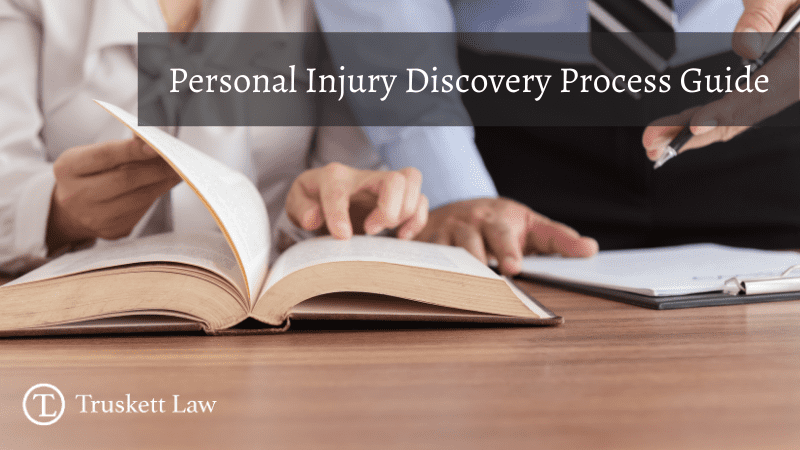
09 Nov Personal Injury Discovery Process Guide
Complete Guide to Personal Injury Discovery Process
When it comes to personal injury cases, the discovery portion is crucial. This guide helps you understand what the discovery is, and how to assist your law team to get the best results in court
So, what is the personal injury discovery process? In personal injury law, discovery refers to the evidence gathered from an insurance company during pretrial negotiations. It is common for the defense to provide information that will prompt plaintiffs ‘ attorneys to settle a case before it goes to trial.
The discovery process is unique in personal injury cases because the plaintiff is required to answer questions from his or her attorney and defense attorney. For instance, a plaintiff may be asked how much money he or she makes per year and what assets he or she has. Of course, this information is protected by confidentiality laws that prevent it from going outside of the courtroom.
Keep reading to learn more about the discovery process for a personal injury case!
What is the Discovery Process?
In the world of law, discovery is a process that allows attorneys for each side to obtain evidence from the other side in regards to a legal case. In addition, it allows the accused or defendant to get information that may be used in his or her favor. Discovery can include information such as medical records and bills, phone record and billing information, and even the salaries of the opposing party.
Discovery is generally conducted through questionnaires or requests that provide interrogatories. In addition, depositions can be given as well. Depositions are question and answer sessions that are recorded by a court reporter and are under oath. If a party refuses to answer deposition questions or provide discovery, there are penalties for doing so.
What Is A Personal Injury Case?
 A personal injury case is when a party is negligent and at fault in regard to another party’s injury. For many, the idea of personal injuries conjures up images of car accidents or slip and falls on dangerous surfaces.
A personal injury case is when a party is negligent and at fault in regard to another party’s injury. For many, the idea of personal injuries conjures up images of car accidents or slip and falls on dangerous surfaces.
These are certainly some of the most common types of personal injury claims, but they are not the only ones. Personal injury claims can also be made after an accident in which medical malpractice was committed.
A Guide for Personal Injury Discovery
The key to any good settlement negotiation is the exchange of information. This process guide describes the types of information typically exchanged between parties, as well as how it should be delivered.
Step 1: Exchange Information
Parties must exchange names and addresses of all potential witnesses, as well as parties who might have information about the case. This includes both the plaintiff(s) and defendant(s). Parties should prepare a list that can be exchanged by email or by fax.
Once parties have exchanged names and addresses of potential witnesses, they should exchange witness lists. If a party knows the name of a witness to whom it would want to send a subpoena, that information must be disclosed. The plaintiff(s) need not disclose whether or not they intend to call a particular person as a witness. Parties should prepare a list that can be exchanged by email or fax.
Each party must disclose to each other the names of all expert witnesses intended to be used in the trial. Parties should prepare a list that can be exchanged by email or fax. If you are subpoenaing an expert witness on behalf of your opponent, you must disclose the name of the expert witness to be subpoenaed.
Step 2: Exchange Deposition Designation
Only after a party has been designated as a deponent in response to an interrogatory or request for production may it designate another person as to its corporate representative. However, any deponent who is designated as a corporate representative must still provide the deposition notice to all parties.
This is because deponents who are also corporate representatives will be online for depositions, and therefore not available until they have been designated as a deponent by another party. Each party should prepare a list that can be exchanged by email or fax.
Step 3: Exchange Documents
 Parties must exchange all internal documents. Internal documents are any communications between or among lawyers, employees, or agents of a party about the claims or defense in this case. Each party should prepare a list that can be exchanged by email or fax.
Parties must exchange all internal documents. Internal documents are any communications between or among lawyers, employees, or agents of a party about the claims or defense in this case. Each party should prepare a list that can be exchanged by email or fax.
Parties must exchange all documents describing their insurance coverage and any claims made policies. including documents describing torts, injuries, and damages.
Step 4: Exchange Affirmative Defenses
Parties must exchange all affirmative defenses, including both general and more specific defenses, such as the assumption of the risk or comparative fault. Parties should prepare a list that can be exchanged by email or fax.
Step 5: Exchange Witness Statements
Witness statements are typically exchanged after the witness has been designated to be deposed.
Parties may agree on an earlier exchange of statements. However, if they do not, statements must be exchanged at least twenty days before the scheduled deposition. Each party should prepare a list that can be exchanged by email or fax.
Step 6: Exchange Information for the Deposition
If there is an actual deposition scheduled for any particular party, that party should immediately provide the other parties with a copy of their transcript to expedite the discovery process. Transcripts should be exchanged at least ten days before the scheduled deposition. Each party should prepare a list that can be exchanged by email or fax.
Any party intending to use an expert witness in the trial must disclose that name to all parties at least 90 days before the scheduled trial. If you are served with a subpoena for an expert witness on your opponent’s behalf, you must disclose the name of the expert witness to whom it relates. Parties should prepare a list that can be exchanged by email or fax.
Step 7: Prepare
If you are planning to conduct a deposition of your opponent’s witness, e.g., if the opposing party is not available or refuses to cooperate, then you must disclose certain information about that witness at least 10 days before the scheduled deposition. Parties should prepare a list that can be exchanged by email or fax.
According to Rule 26(a)(1), parties must exchange lists of potential witnesses at least 90 days before trial. Parties may agree on an earlier date for exchanging lists. However, it is required no later than 90 days before the scheduled trial date. They should prepare a list that can be exchanged by email or fax.
Each party should prepare a list that can be exchanged by email or fax.
Step 8: Exchange Dispositive Motions
Any party may request an extension of time to respond to a dispositive motion. One in which the moving party is asking for dismissal or summary judgment on the case. The judge may grant the extension for good cause shown. However, they must set a specific new date for filing and serving opposition to the motion. Parties should prepare a list that can be exchanged by email or fax.
Step 9: Exchange Claim and Defense Forms
 Under Rule 26(a)(2), if you intend to use a written interrogatory (i.e., one which is typewritten and not written in paragraph form, usually submitted on a specialized form) during the trial, you have to exchange forms with the other party at least 14 days before the scheduled deposition. Each party should prepare a list that can be exchanged by email or fax.
Under Rule 26(a)(2), if you intend to use a written interrogatory (i.e., one which is typewritten and not written in paragraph form, usually submitted on a specialized form) during the trial, you have to exchange forms with the other party at least 14 days before the scheduled deposition. Each party should prepare a list that can be exchanged by email or fax.
Step 10: Exchange Expert Witness Designations
Any party intending to use an expert witness in the trial must disclose that name to all parties at least 90 days before the scheduled trial. If you are served with a subpoena for an expert witness on your opponent’s behalf, you must disclose the name of the expert witness to whom it relates. Parties should prepare a list that can be exchanged by email or fax
If you have further questions about the discovery process for personal injury cases, contact the Truskett Law team today!


Sorry, the comment form is closed at this time.